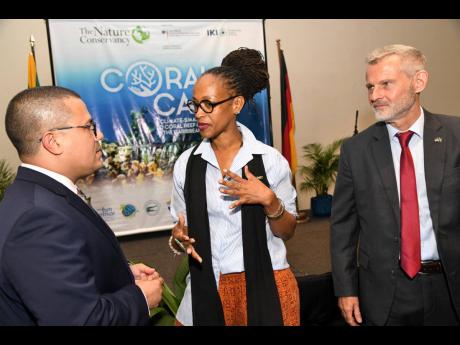Montego Bay under the weather
Montego Bay, St James, Jamaica’s tourism mecca, is reeling from the ongoing deleterious effects of climage change, a situation which was recently brought to public attention by Matthew Samuda, minister without portfolio in the Ministry of Economic Growth and Job Creation.
Samuda, who has portfolio responsibility for the environment, was addressing the launch of the CoralCarib project at The Jamaica Pegasus hotel in New Kingston on Tuesday, where he referenced the State of the Jamaican Climate 2019 report which was published in March 2021 and notes, among other things, that:
• Climate change in conjunction with poor environmental practices threatens diversity
• Continued coastal development, which sometimes involves the removal of natural barriers such as mangroves and coral reefs for (the construction of) roads, bridges and human settlements, increases vulnerability to sea-level rise and storm surges
“Coral reefs are already facing impacts from climate change, which are thereby affecting reef fisheries ... If we took Montego Bay as an example, the EPA’s (Environmental Protection Agency) Coral Reef Health Index, which measures live coral cover, among other indicators, gave Montego Bay reefs a ‘poor’ rating of 2 out of 5 in 2013 and ‘fair’ rating of 2.7 out of 5 in 2017. Ongoing threats to the reefs in Montego Bay include poor waste disposal, heritage clearance of hotel development, overfishing, hurricanes and bleaching events,” Samuda disclosed.
However, a check of the Coral Health Status Report for Jamaica: 2020 by The Gleaner found that the general the state of Jamaica’s coral reefs has got much worse since that time.
Compiled by staff of the Ecosystems Management Branch of the National Environment and Planning Agency (NEPA), the report notes that the coral reef health index (CRHI) has become a method of effectively tracking reef status.
“Regionally, Jamaica’s ‘poor’ ranking is lower than that of the Caribbean which has a calculated ranking of ‘fair’. Jamaica’s CRHI has generally been consistent in its ranking as ‘poor’ for the last 10 years. Since, 2011, with the exception of 2014, the CRHI has ranged from 2.1 to 2.4. In 2020, Jamaica’s CRHI reached an unprecedented low at 2. This indicates that the health of the reef system has been in steady decline over the past decade. None of the 22 sites assessed in 2020 have achieved a ‘good’ ranking,” according to the Coral Health Status Report for Jamaica: 2020.
Tourism infrastructure
Samuda weighed in on the ongoing development of tourism infrastructure and the likely implications for the country’s environment in the long run.
“The high density of tourism development and infrastructure in coastal areas and tourism’s dependence on climate-sensitive ecosystems, such as coral reefs, make tourism in Jamaica highly sensitive to climate variability and change impacts,” the de facto environment minister charged. However, he noted that, with a concerted effort, the situation can be reversed.
“Given the importance of coral reefs in mitigating the effects of climate change, food security, poverty reduction, economic growth and development and environmental sustainability, it is imperative that there is a ‘whole of society approach’ to the conservation of the islands’ marine and coastal ecosystems, including our coral reefs.
“The Environmental Protection Agency states that ‘there’s still time to save coral reefs, but it’ll require swiftly addressing the three largest impacts to reefs: land-based pollution, overfishing and, most importantly, climate change’. This means that there is still hope and we must pool our resources together to achieve our targets.”
Meanwhile, Tourism Minister Edmund Bartlett, in chairing the Fifth Special Meeting of the Inter-American Committee on Tourism at the Organization of American States (OAS) headquarters in Washington, DC, on April 14, pointed out that building tourism resilience was critical to ensuring the sector’s sustainability and its contribution to the economy.
“As member states in the OAS family, we must recognise the nexus between resilience and sustainable development, and tourism’s role in it. A resilient tourism must operate in a way that protects the environment and supports local communities, including small and medium-size tourism enterprises, while at the same time ensuring economic viability.
“Tourism must also prioritise creating a workforce that reflects the communities it serves to deliver both an enhanced product, as well as to accrue more benefits to a broader range of stakeholders in the tourism value chain,” he added.


